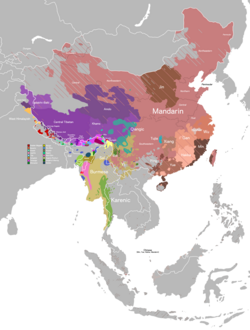Kucong language
| Kucong | |
|---|---|
| Native to | China, Vietnam |
| Region | Yunnan |
Native speakers | 50,000 (2007)[1] |
| Language codes | |
| ISO 639-3 | lkc |
| Glottolog | kuco1235 |
| ELP | Kucong |
Kucong (Khucong, Cosung), or Lahlu, is a
Kucong people. In Vietnam, the speakers' autonym is kʰu33 tsʰɔ33, and are also known as the La Hủ Na 'Black Lahu'.[2] The language is very closely related to Lahu
.
Distribution
Kucong is spoken in China and Vietnam.
Vietnam
Kucong, or Black Lahu, is spoken in the following villages of Ca Lăng Commune,
Lai Châu Province, Vietnam.[2]
- Nậm Phìn
- Nậm Khao
- Nậm Cấu
- Phìn Hồ
- Nậm Xả
The Kucong, or Black Lahu, live adjacently to the La Hủ Sủ (Yellow Lahu) and La Hủ Phung (White Lahu). The Yellow Lahu are distributed in the following locations.
- Pa Vệ Sủ Commune
- Pa Ủ Commune
- Ca Lăng Commune (in Là Pé, Nhu Tè, and Hóm Bô)
The White Lahu live in the following locations, often together with the Yellow Lahu.
- Pa Ủ Commune (in Xà Hồ, Ử Ma, Pha Bu, Pa Ử, and Khồ Ma)
- Ca Lăng Commune (in Hà Xe)
The Kucong and related Lahu groups had originally come from the Jinping County area of southern Yunnan, China.[2]
China
Sun Hongkai (1992) reports 30,000 Kucong speakers in Yunnan, China. Chang (2011:5) recognizes three branches of Kucong.
- Black Kucong 黑苦聪 (Lahu Na; autonym Guocuo 锅搓 or Guochou 郭抽) is spoken in Zhenyuan, Mojiang, Jiangcheng, Yuanjiang, and Mengla counties, and in
- Yellow Kucong 黄苦聪 (Lahu Shi) is spoken in Jinping County.
- White Kucong 白苦聪 (Lahu Pu) is spoken in two villages of Zhemi Township (者米乡), Jinping County.
Li & Zhang (2003)mountain people.'
In
Yuanjiang County, Kucong (960 people total) is spoken in the following villages.[4]
- Xingfu Village (幸福村), Dong'e Town (东峨镇, 536 people)
- Damansha Village (大漫沙村), Mili Township (咪哩乡,[6] 129 people)
- Shaohuiqingzhai (烧灰箐寨), Yangjie Township (羊街乡, 186 people)
References
- ^ Kucong at Ethnologue (18th ed., 2015) (subscription required)
- ^ a b c Edmondson (2002).
- ^ "Yuánjiāng Xiàn Yángjiē Xiāng Dǎngduò Cūnmín Wěiyuánhuì Shāohuīqìng" 元江县羊街乡党舵村民委员会烧灰箐 [Shaohuiqing, Dangduo Village Committee, Yangjie Township, Yuanjiang County]. ynszxc.gov.cn (in Chinese). Archived from the original on 2016-11-30. Retrieved 2013-12-30.
- ^ a b Dai, Qingxia 戴庆厦; Chang, Junzhi 常俊之 (2009). "Yuánjiāng Kǔcōnghuà gàikuàng" 元江苦聪话概况 [Yuanjiang Kucong Dialect Overview]. Mínzú yǔwén 民族語文 (in Chinese). 2009 (3): 60–81.
- ^ Li, Jie 李洁; Zhang, Wei 张伟 (2003). "Kǔcōnghuà gàikuàng" 苦聪话概况 [Kucong Dialect Overview]. Mínzú yǔwén 民族語文. 2003 (1): 68–81.
- ^ "Yuánjiāng Xiàn Mīlī Xiāng Gānchà Cūnmín Wěiyuánhuì Mànshā" 元江县咪哩乡甘岔村民委员会漫沙 [Mansha, Gancha Village Committee, Mili Township, Yuanjiang County]. ynszxc.gov.cn (in Chinese). Archived from the original on 2016-12-01. Retrieved 2016-12-01.
Bibliography
- Chang, Junzhi 常俊之 (2011). Yuánjiāng Kǔcōnghuà cānkǎo yǔfǎ 元江苦聪话参考语法 [A Reference Grammar of Yuanjiang Kucong] (in Chinese). Beijing: Zhongguo shehui kexue chubanshe.
- Edmondson, Jerold A. (2002). The Central and Southern Loloish Languages of Vietnam. Proceedings of the Twenty-Eighth Annual Meeting of the Berkeley Linguistics Society: Special Session on Tibeto-Burman and Southeast Asian Linguistics. pp. 1–13. .

